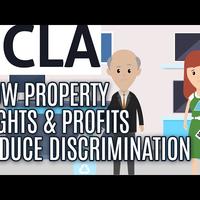Essential UCLA School of Economics: How Property Rights & Profits Reduce Discrimination
Lo esencial en la Escuela de Economía de la UCLA: Cómo los derechos de propiedad y los beneficios reducen la discriminación
エッセンシャル UCLA スクール オブ エコノミクス: 所有権と利益が差別を軽減する方法
Essential UCLA School of Economics: Como os direitos de propriedade e os lucros reduzem a discriminação
Основна школа економіки UCLA: як права власності та прибуток зменшують дискримінацію
加州大学洛杉矶分校经济学院必读:产权与利润如何减少歧视
Welcome to the essential ideas of the UCLA school of Economics.
Welcome to the essential ideas of the UCLA school of Economics.
Ласкаво просимо до основних ідей школи економіки UCLA.
Building on the pioneering work of Nobel laureate Gary Becker,
Com base no trabalho pioneiro do prémio Nobel Gary Becker,
Спираючись на новаторську роботу нобелівського лауреата Гарі Бекера,
who showed that companies that discriminate pay a cost in the form of lower profits,
who showed that companies that discriminate pay a cost in the form of lower profits,
差別を行う企業は利益の減少という形で代償を払うことを示した、
que demonstrou que as empresas que discriminam pagam um custo sob a forma de lucros mais baixos,
який показав, що компанії, які дискримінують, платять витрати у вигляді нижчого прибутку,
Armen Alchian of the UCLA school found that government regulations that limit a company's
UCLAスクールのArmen Alchianは、政府の規制が企業の活動を制限していることを発見しました。
Armen Alchian, da escola da UCLA, descobriu que as regulamentações governamentais que limitam a actividade de uma empresa
Армен Алчіан зі школи UCLA виявив, що урядові постанови обмежують діяльність компаній
profits lowers the cost of discrimination which could lead to more discrimination.
利益は、より多くの差別につながる可能性のある差別のコストを削減します。
os lucros reduzem o custo da discriminação, o que pode levar a mais discriminação.
прибуток знижує вартість дискримінації, що може призвести до більшої дискримінації.
Let's explore this important finding using an example.
Vamos explorar esta importante descoberta através de um exemplo.
A business in Marketville sells televisions. If it discriminates by refusing to hire blue
Uma empresa em Marketville vende televisores. Se discriminar, recusando-se a contratar trabalhadores azuis, a empresa pode
Бізнес у Маркетвіллі продає телевізори. Якщо він дискримінує, відмовляючись наймати синього
triangle people, the company will suffer from having a less productive workforce,
Se a empresa não tiver pessoas triangulares, sofrerá com o facto de ter uma força de trabalho menos produtiva,
трикутника, компанія буде страждати від того, що матиме менш продуктивну робочу силу,
which reduces its profits. The same is true if the television company refuses to sell TVs to
blue triangle people—it will make less profit. So the company in Marketville has to decide
whether it cares more about discriminating against blue triangle people, or making
se se preocupa mais em discriminar as pessoas do triângulo azul, ou em fazer
чи вона більше піклується про дискримінацію людей із синього трикутника чи створення
money. Let's say it chooses more profits and doesn't discriminate.
dinheiro. Digamos que opta por mais lucros e não discrimina.
Now, suppose the government of Marketville becomes concerned about the large profits of television
Agora, suponhamos que o governo de Marketville fica preocupado com os grandes lucros da televisão
shops, so it imposes a new regulation limiting how much profit television shops can make.
e, por isso, impõe um novo regulamento que limita os lucros que as lojas de televisão podem obter.
магазинів, тому він встановлює нове положення, що обмежує прибуток телевізійних магазинів.
Now, the company doesn't face the same tradeoff between discriminating against blue triangle
Agora, a empresa não enfrenta o mesmo dilema entre discriminar o triângulo azul
Тепер компанія не стикається з тим самим компромісом між дискримінацією синього трикутника
people and profits. Before the regulation, it could maximize profits only by not discriminating.
pessoas e lucros. Antes do regulamento, a empresa só podia maximizar os lucros se não discriminasse.
людей і прибутків. До регулювання він міг максимізувати прибуток, лише не дискримінуючи.
But now, because the regulation limits profits, it might not lose any profits
Mas agora, como o regulamento limita os lucros, pode não perder nenhum lucro
Але тепер, оскільки регулювання обмежує прибуток, воно може не втратити жодного прибутку
by discriminating. The limit on profits actually leads to more discrimination.
através da discriminação. A limitação dos lucros conduz efectivamente a uma maior discriminação.
This critical insight into how limits on profits make it less costly to discriminate
Esta visão crítica sobre a forma como os limites aos lucros tornam menos dispendiosa a discriminação
Це критичне розуміння того, як обмеження прибутку роблять дискримінацію менш витратною
has furthered our understanding of the power and benefits of property rights.
aprofundou a nossa compreensão do poder e dos benefícios dos direitos de propriedade.
покращив наше розуміння сили та переваг прав власності.
For more information on UCLA Economics visit EssentialUCLAEconomics.org
Для отримання додаткової інформації про UCLA Economics відвідайте EssentialUCLAEconomics.org
and to learn about more Essential Scholars visit EssentialScholars.org
а щоб дізнатися більше про Essential Scholars, відвідайте EssentialScholars.org

